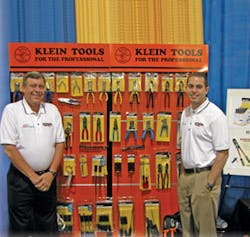The next time you question the impact customer service can have on your business, consider the story of Mathias Klein.
The year is 1857. The place is the bustling Midwestern town of Chicago, and more specifically, the forge of a German immigrant and blacksmith named Mathias Klein. One day a man repairing one of the city’s telegraph lines enters his shop.
Klein pauses from his everyday duties to speak with the man, who has apparently broken one of the handles on his cutting pliers. Klein takes the pliers and forges a new handle to help get the man back to work. A couple of weeks later the same man returns to Klein’s shop. He’s not there to complain, but to ask if the blacksmith can repair the other handle in the same manner as he fixed the first. Again, the blacksmith pauses to accommodate the man’s request.
The telegraph line repairer is so impressed with the quality and craftsmanship of his newly forged tool that he tells others. And those people tell people. And so do those people. And on and on it goes. But if you really want to understand the dividends of customer service and high-quality products, you have to look not at this specific event, but rather at its ramifications.
Nearly 150 years after helping their first customer, Klein Tools employs more than 1,000 people nationwide, with five U.S. manufacturing plants pumping out a growing product line comprised of over 3,000 SKUs. The company is also owned and managed by the fifth generation of Kleins, including Richard T. Klein, Jr., who serves as chairman of the board and CEO; Mathias A. Klein III, president; Tom Klein, executive vice president and treasurer; and Mark Klein (sixth generation), the company’s sales and marketing support specialist.
Customer Appreciation
Klein Tools is a classic example of how the more things change, the more they stay the same. When Mathias Klein produced what the company cites as the first pair of pliers made in the U.S., he was equipped with a forge most likely powered by coal, and a focus on quality. While Klein’s focus hasn’t changed, these modern-day blacksmiths call for equipment that packs a little more technology.
The pictures used in this article were supplied by Klein Tools, as access to their manufacturing facilities is limited, and photography prohibited. The company closely guards its proprietary manufacturing technologies and boasts cutting edge equipment that they say is often specifically designed just for them.
In some cases they may also be the only company in North America that has implemented these machines for forging, manipulating and treating the specialized U.S. Tool Steel they use in creating products from screwdriver blades, pliers and nut drivers to wire strippers and hex keys.
“Our manufacturing processes and attention to engineering details are what sets us apart when it comes to measuring the quality of our tools,” states John McDevitt, Klein’s executive vice president of sales and marketing. “We’ve invested significantly in production technology that allows us to make tools that last longer and deliver more precise results.
"In many cases this means special hardening and heat-treating processes that are specific to each tool, or in some instances, each part of a tool. We take these steps to ensure the right feel and functionality for the wide-ranging group of professionals that we serve.”
“Our real hope,” continues Mark Klein, “is that our tools reflect the same values as those who use and sell them. We want to work with people who appreciate quality products centered on customer needs.”
Another driving force behind the company is a commitment to manufacturing in the U.S. McDevitt states that 95 percent of the Klein product family is made in either Illinois, Michigan or Arkansas.
“We want to support the people here,” he explains. “The bottom line is that we want to operate here in the U.S., so we do. U.S.-based manufacturing facilities, like ours, that have received investments in new manufacturing technologies are winning by providing superior value. This includes American-owned plants as well as foreign-owned plants. The issue is not U.S.-based manufacturing - it's all about investment and technology.”
Interestingly enough, combining the company’s recent international sales growth with their focused production scheme places Klein in a select group of companies that exports more than it imports.
The realization of all these quality-focused practices is a higher price for what Klein positions as a premium tool line. Adding to this mix are higher steel costs and growing fuel expenses. The later of which the company needs in generating heat for the special hardening and heat-treating processes. The impacts of rising oil prices also hit home in relation to the coolant and lubricant needed to maintain all of their state-of-the-art production equipment. Once these things are considered, Klein's pricing scheme seems to fall into line.
In response to any pricing concerns, McDevitt simply responds with a question of his own: “What are the costs associated with a broken tool?”
Opening New Doors
While Klein enjoys a leading position in several industrial, service and construction markets, the company sees its next stage of growth coming from complementary segments like automotive and aviation. Taking this a step further, Klein has already developed and released several products specifically intended for automotive repair, like their insulated battery cable crimping tools.
Additionally, as hybrid vehicles with greater voltage levels start to enter the repair marketplace, hand tools with heavier insulation will be key. Alan Frakes has been heading up Klein’s efforts to grow their presence in the automotive sector.
“We know that there is some well-established competition in these adjacent markets,” states Klein. “But we also feel there’s a pretty strong case for a distributor to carry our products.” He cites the following reasons:
- The strength of the Klein brand. Already prominent in several other professional markets, Klein is recognized as a high-end choice. A growing product line also offers extended coverage from a single brand.
- Product quality, especially for some specialized categories like wire strippers and crimpers, as well as their wide-ranging collection of pliers.
- Order fulfillment. According to Klein, the company’s track record shows that 99 percent of their orders ship in full within 24 hours. So as they start to partner with more tool and equipment warehouses like Neu Tool, K-Tool, P.B.E. Jobbers Warehouse and Integrated Supply Network (ISN), these distributors can be confident that their customers will have access to whatever they need. Additionally, advancements in Klein’s fulfillment system allow WDs to place orders on-line and in real-time, meaning everyone involved can see what the inventory levels are and adjust production and fulfillment accordingly.
- Customer service. In addition to a lifetime warranty covering any manufacturer defects, Klein states that the company has worked to instill a very simple and no-hassle return policy. Sales support. In adjusting to the selling channels of each marketplace in which they operate, Klein has developed numerous promotional packages to help the seller. This includes specialized signage, point-of-purchase displays, planograms and other sales pieces for mobile and stationary retail settings. Klein Tool distributors are also supported by sponsorships that include:
- An Indy Racing League (IRL) affiliation with Andretti Green Racing since 2003. They are the primary sponsor of the #27 car piloted by Dario Franchitti.
- Becoming the Official Hand Tool of the American Le Mans Series in 2005.
- Klein Tools is a regular sponsor of Michael Mancuso Air shows.
- The company has been a sponsor of the annual Experimental Aircraft Association’s Air Venture event in Oshkosh, WI since 2004. The EAA “Fly-In” draws varying types of aircraft and attendees from all over the country.
- Skokie, IL; The company’s former headquarters and site of pliers, grips and other hand tool manufacturing.
- Roselle, IL; Adjustable wrenches, wire strippers, construction wrenches and other hand tool manufacturing.
- Fort Smith, AK; Protective equipment and canvas, as well as leather and nylon item production.
- Jonesville, MI; Screwdriver, nut driver, hex key and other tool manufacturing.
Next year marks Klein Tools’ 150th Anniversary. The Chicago area in which they operate has changed over the years, but the company is still committed to being “made in the U.S.A.”
The manufacturing technology at their disposal has changed tremendously, but their devotion to quality craftsmanship remains true.
The applications and geographic reach of their products expand daily, but the ability to do so is controlled by a single family.
Yeah, the more things change, the more they stay the same.
Made In The U.S.A.
Klein Tools operates manufacturing facilities located in:
The company’s primary distribution center is located in Cedar Rapids, IA and their new corporate headquarters recently opened in Lincolnshire, IL.


